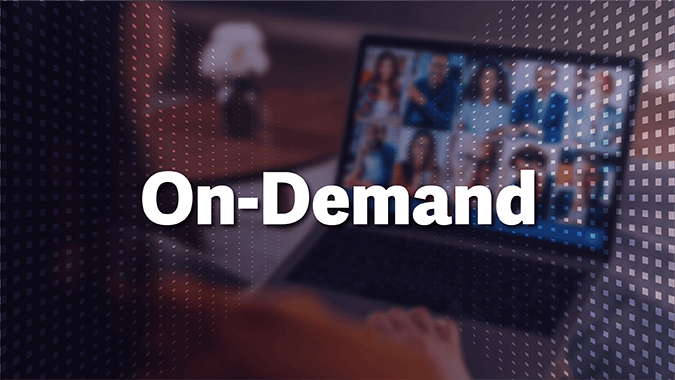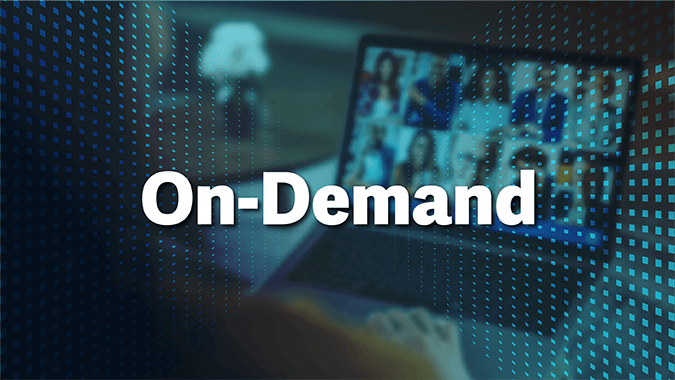
Best Practices for Working from Home
- Published
- Apr 21, 2021
- Share
Join us as Alexa Scudillo talks with behavioral expert Natalie McVeigh, a director in the Center for Individual and Organizational Performance, about operating efficiently in the new normal. Natalie provides current best practices for effectively working from home.
Transcript
Alexa Scudillo: Hi everyone. My name is Alexa Scudillo, and I'm on the Center for Individual and Organizational Performance Team. Thank you so much for joining our podcast today. I'm really grateful to have Natalie McVeigh, going over some neurohacks in the new world that we live and work in. So how this is going to work is, I'm going to get some questions going for Natalie and she'll offer us some insight on how to keep ourselves going in these turbulent and changing times. So with that being said, let's get started. I want to begin with a brief overview of what the world looks like in the thick of this pandemic. What do you anticipate the future looking like in this post COVID world, and how do we cope?
Natalie McVeigh: Great. Thanks. Hi everyone. I thought I'd just talk a little bit about what we're seeing in our clients, in ourselves, and some things you can do to be aware of what's going on. I love that today started with a quote. I'm going to add one too. It's one I use with the clients. I work with in families because in our families, we change every day, but we don't notice how much we're changing.
It's kind of like when you go to a reunion and you come back and you realize they're all weird, but they all live in the same town and they're thinking that you're the weird one. So we don't see those minor changes, but it's an L.P. Hartley quote that says, "The past is a foreign country, they do things differently there." So our past, our pre-COVID lives, are very different than this current time.
And then everyone keeps talking about this next new normal. And I have really mixed feelings about this next new normal, and the research says the same thing, because COVID has been challenging, but in the ways that it's been challenging, it has also created a lot of opportunity, a lot of difference. One is really dealing with uncertainty. Our brains are not meant to deal with uncertainty, and it can cause unmitigated stress, if we don't learn to deal with uncertainty.
But since there are tangible ways to deal with uncertainty, losing the idea that we can cope with uncertainty is really hard. One is that you can envision that future state without having all the data, and do that based on what success measures there are. And then also regulate our expectations. I think most of us have been regulating our expectations.
If we cast our mind back a year ago and what was a good time, sometimes just having a good time now is just getting through the day and not hearing complaints from our friends, our family is healthy. And being able to make choices with the limited data that you have, which is really useful. Because we know that one of the main differentiators for leaders nowadays is decisiveness. And we're too often experiencing analysis paralysis, and we have to force to choose now. So, that's one of the things, as we're able to deal with uncertainty better.
AS: Natalie, that's great. Thank you. I'm glad you touched on uncertainty. We really are in such unexplored and unchartered territory. I mean, with this comes the development of new habits, new stressors. And one stressor that I've heard in particular is this theme of Zoom fatigue. What do you suggest we do to distance ourselves from this?
NM:So, Zoom fatigue has several components. One, it has to do with stacking meetings, because we're meant to single focus. So if I go from this to the next thing, to the next thing, without giving myself a buffer five minutes, 10 minutes, and if you can only get 30 seconds, but really shifting off, closing your eyes, whatever it takes. What we end up doing is taxing our brain double cause we haven't finished the thing we were already thinking about before we move on to the next thing.
At least I can tell you in my work, what that looks like is my memory is getting compromised. They used to have an almost perfect memory. And now, I'll be talking to partners about a family and I'm mixing them up. And it's, "I'm not giving myself enough space." The other issue with Zoom fatigue is that we're looking at ourselves. So whenever possible, finding a way that you can't see yourself when you're on the screen, because what we're used to doing is looking at other people's cues to see how they're doing. But when we see ourselves we'll become self-conscious.
And so, we end up looking at ourselves and we're monitoring our normal reactions as we're going on. So there's the secondary level of exhaustion that's happening from Zoom fatigue. And the other is just the amount of time that we're on screens. If you've ever heard me talk, I've said it, and I'll say it again. Get some anti-fatigue glasses. I have two versions of this one for the day, and as soon as it turns five o'clock, I have another one that look stupider, but is a really, really good conversation starter.
AS: I've sat in, in calls, and heard clients repeatedly expressed how much they miss the in-person connectedness that comes with working in an office. Being able to see your colleagues for coffee in the morning, during lunchtime, et cetera. It's an unfortunate consequence of COVID that we don't have the sort of connectedness or opportunity to collaborate in person. So, how do you suggest we remain collaborative in our workspace with such a lack of in-person connection?
NM: So, of that time that we're at home, we're doing less and less collaboration. So, finding ways to make our meetings and our joint time feel collaborative is going to be the most effective thing, because we can get a lot done asynchronously yet we're missing a bunch of thought leadership there. We're also missing that connection.
We're missing that idea that we feel like team that we can trust each other. So finding small ways, it could be someone reviewing an email for you. It can be anything very simple, but finding ways to putting more hands on an idea than just your own, and not worry about reaching out.
AS: I want to say on the subject of connectedness, social media is a great way for us to remain connected with each other. And some research has shown that since the pandemic social media users are spending an additional one to two hours on social media a day. What's the impact of this?
NM:The other thing that we want to discard is really this fear of missing out. I know that sounds really hard to do, but social media, it has always been really challenging. They did studies as early as 2010, which if you think about the advent of social media, that was pretty early on in social media's life. And the studies since then have consistently said the same thing, which is, "Social media asked us to do things differently than we'd like to do." They're shaming us.
And right now what people are shaming us about, and they're not meaning to, are all of the things they've accomplished during COVID, where sometimes the only thing you can get up and do as your job. And someone else has learned a language, and someone else's getting another credential. And you're like, I'm just doing the things that I need to do to get through. So really putting aside that external expectation, and creating realistic expectations for yourself, that changed daily.
So you want to have overarching goals. And for those of you passed the CPA exam, that's incredible, and congratulations to you. And my guess is, you knew that that was your overarching goal. And there are some days where you just can't meet that goal. So if you have a two hour study session each night - I've never taken the CPA exam, so I don't know. But I can tell you in one of the exams I'm setting for, that's my goal, it's two hours each day.
And some days I say, "Today is the day that there's no studying," or I say, "Today it's a half an hour, and that's all that I can do." And to not really compare yourself to other people is going to be really helpful, because what we end up doing is adding more and more and more things to us. And we create that load in our brain. And our brain can only hold so much information.
We have always called it the teacup theory. The teacup theory is like you have a teacup and it'll only hold so much tea, and something else will escape from that. So being really clear on what we're putting in our teacup, so that we understand what's going to come out the other end, because we have sacrifice something.
We're not a renewable resource. Our time is finite. Our energy is finite. So understanding when you're getting those FOMO moments, what's really there? And what would you lose to do that one thing that's outside of you?
AS: God, this is just such a heavy subject. I can feel myself needing to just take a deep breath, asking you these questions. A lot of us are proactive people. We don't want to feel like this. We don't want to feel this way that comes from it. And so, what are proactive ways you see us combating volatility, uncertainty, complexity, ambiguity, all of these trends that have just been coming from working during a pandemic, existing during a pandemic.
NM: Great point, Alexa, because this isn't really just about what's happening to you. It's about how you can understand it to do more. So there are three main things. One is monitoring your energy. The reason I even got screen fatigue glasses was, I'd be working and realized that I was really tired at night, even though I hadn't done anything physical.
And I had a conversation with my doctor who described to me that my screen time had increased because everyone's screen time has increased. We've lost that commute time, which most of us are happy about, but we're starting work right away. Our days are longer. So what's taxing you? Understand that in your body, in your energy and then try to do something about it. The other is 'ask for help'.
We talked a lot about connection today and believe it or not, we're always worried about asking for help because we're afraid someone will think less of us. The research says the opposite that, "I like to be congruent. Therefore, if I help you, I want you to succeed. It makes me closer to you, makes you closer to me." And the last one is really the tools you've all heard of rest, mindfulness, meditation, or somatic movement, which we call yoga.
And the reason these physical and mental exercises combined help us, is that we're doing these things very separately. We're separating our mind from our emotional experience from our physical body, which is making us work harder to again, stay congruent. So, those three things. Even honestly take two out of the three, practice intentionally and you'll see a world of difference.
AS: Breathing techniques are a great tool to get your head into the mind space that you needed to be, to tackle whatever your next task is in the day. Natalie, thank you so much for joining us today. Your insight has provided so much clarity in a time of real uncertainty. For everybody else who's listening, if you'd like more information, please go to our website, that's eisneramper.com/CIOP.
Transcribed by Rev.com
Also Available On
What's on Your Mind?
Start a conversation with the team










